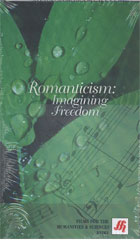
Romanticism: Imagining Freedom 2005
Distributed by Films Media Group, PO Box 2053, Princeton, New Jersey 08543-2053; 800-257-5126
Produced by Films Media Group
Directed by Didac Aparicio and Rosa Pons
VHS, color, 53 min.
Sr. High - College
Art History, Literature, Music, Philosophy, History
Date Entered: 06/21/2005
Reviewed by Susanne Boatright, Library, Blue River Community College, one of the Metropolitan Community Colleges, Kansas City, MOIdeal for an upper level high school or college humanities course, this film discusses the underpinnings of the Romantic period in history, which spanned the course of one hundred years, from 1770 until 1870. Music by Chopin, Lizt, Beethoven, Wagner and Schubert accompanies stunning visuals of the paintings of Friederich, Blake, Delacroix, David and Bierstock, to name just a few. Readings from Whitman, Emerson, Thoreau, Keats, Hegel, Gerta, and Schilling round out the program.
Scholars Susan Wolfson, professor of English at Princeton University, Rafael Argullol Murgados, director of the Institut Universitari de Cultura, Xavier Antich, professor of aesthetics at the Universitat de Girona and David Reynolds, distinguished professor of English at Baruch College provide a continual narrative thread which links the characteristics of this movement to contemporary culture.
Two features of the Romantic Period that still resonate in today’s culture are the awareness that we are living in a time of crisis and the importance of the subjective judgment of the individual. Many of the themes common in art and literature today can be traced directly back to the romantic period, in particular, the horror/terror genre and the tragic romantic hero. American Romanticism took on an identity of its own, becoming a more intense and vital part of the culture than did its European counterpart.
This film presents a large amount of material in a well-organized, coherent narrative sequence. It is highly recommended for any college humanities course and would also be appropriate for an upper level or honors high school course.